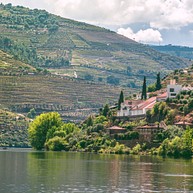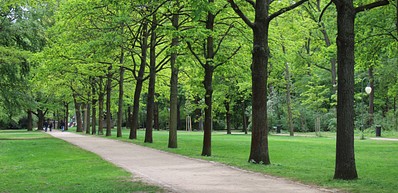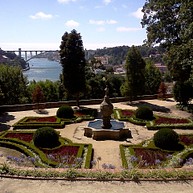
-
![Douro Valley - Quinta de la Rosa. Pinhão, Portugal]() Provided by: Rach Sam/Unsplash
Provided by: Rach Sam/Unsplash -
![Vineyards in the Douro Valley, Portugal]() Provided by: Maksym Kaharlytskyi/Unsplash
Provided by: Maksym Kaharlytskyi/Unsplash -
![The grapes on the vineyards in Douro Valley, Portugal.]() Provided by: Maksym Kaharlytskyi/Unsplash
Provided by: Maksym Kaharlytskyi/Unsplash -
![Wine tasting in the Douro Valley, Portugal]() Provided by: Maksym Kaharlytskyi/Unsplash
Provided by: Maksym Kaharlytskyi/Unsplash

Our travel guides are free to read and explore online. If you want to get your own copy, the full travel guide for this destination is available to you offline* to bring along anywhere or print for your trip.
*this will be downloaded as a PDF.Price
€4,95
Douro Valley Tour with Wine Tasting & Lunch
The guide was updated:The Douro Valley is not only Portugal's most famous wine region but it's also the oldest demarcated wine-growing area in the world.
So, next time you're in Porto, be sure to include on your itinerary a wine tasting session amid the vineyard-clad hills of the Douro Valley.
You'll savour regional specialities with a traditional lunch in the scenic village of Pinhão then visit two wine estates for an introduction to award-winning local varietals.
Useful Information

From USD 145
Lowest price guaranteedDigital Travel Guide Download
Our travel guides are free to read and explore online. If you want to get your own copy, the full travel guide for this destination is available to you offline* to bring along anywhere or print for your trip.
*this will be downloaded as a PDF.Price
€4,95

Built in 1110 in the highest point in the city, Sé do Porto, or Porto Cathedral, is a defining landmark of the city, and the most important religious building in Porto.
A visit to the cathedral is well worth not only for its historical importance, but also for its remarkable mix of architectural styles that range from Romanesque to Baroque and Gothic, and lastly, for the beautiful views it offers over the city--stretching from the Old Town to the Atlantic coast.
Read more

Douro Valley Tour with Wine Tasting & Lunch
The Douro Valley is not only Portugal's most famous wine region but it's also the oldest demarcated wine-growing area in the world.
So, next time you're in Porto, be sure to include on your itinerary a wine tasting session amid the vineyard-clad hills of the Douro Valley.
You'll savour regional specialities with a traditional lunch in the scenic village of Pinhão then visit two wine estates for an introduction to award-winning local varietals.
Bookable
Read more

Food & Wine Tasting Tour in Porto
Savour traditional Portuguese dishes like codfish cakes and custard tarts and sample the country's most famous export, port wine, on a food & wine tasting tour in Porto.
Stroll through some of the city's quaint neighbourhoods like the historic Riberia district and visit generations-old taverns and traditional cafés to try regional delights and taste northern Portugal's wine, all the while learning interesting facts about Portuguese cuisine.
Bookable
Read more

Ribeira
In the heart of the Old Town, the “Riverbank” quarter of the city contrasts historic winding streets with lively and colourful facades. With abundant restaurants and galleries, this is a great place to venture out during the day as well as at night, when the array of trendy bars and nightclubs open their doors.
Read more

Clérigos Tower
Torre Dos Clérigos is a 75-meters high granite Baroque tower built by the Italian artist Niccolo Nazzoni in the 18th century. Those who endure the steep 240-step journey to the top will be rewarded with a fantastic panoramic view of the city.
You should also visit the Igreja dos Clérigos (Church of the Clerics), a true Baroque masterpiece in the city.
Bookable
Read more

Dom Luis I Bridge
Ponte Dom Luís I (The Dom Luís I Bridge), one of Porto's most famous landmarks, is a 172 metres double-deck metal arch bridge--the longest of its kind in the world--and links the cities of Porto and Vila Nova de Gaia over the River Douro. It is well worth a visit, especially to admire the sunset.
Bookable
Read more

São Bento Railway Station
A must-see while in Porto is the São Bento Railway Station. More than just a train station, this place is another architectural jewel, among the many others this city boasts.
Built by the Portuguese architect José Marques da Silva in 1900, the São Bento Railway Station opened to the public sixteen years later. Its construction took place on the site that once housed a Benedictine monastery, hence the name São Bento.
The architecture has a French Renaissance influence, and even though its facade is already quite impressive, its interior is what leaves visitors truly awestruck. The main hall is beautifully decorated–from the ground to the ceiling — with more than 20,000 "azulejos" (Portuguese tiles), which recount important events of the history of Portugal.
Bookable
Read more

Bolhão Market
At the Mercado do Bolhão, you will find a bright and vibrant open-air market brimming with fresh produce such as olives, cheese, and freshly baked bread. Known for its lively atmosphere, this is a great way to start the day, grab some breakfast or stock up on supplies for a day of sightseeing.
Read more

Livraria Lello
More than just a bookstore, Livraria Lello is a historical and architectural masterpiece in downtown Porto. Opened in 1906, Livraria Lello & Irmão as it is also known combines elements of Neo-Gothic, Art Deco, and Art Nouveau styles that comprise intricate woodwork, a large stained glass window bearing the bookshop monogram with the motto "Decus in labore" (dignity at work, in Latin), and a remarkable red spiral staircase, which starts as one set of stairs and splits into two that join in a circular design. The latter is a huge attraction here since it resembles the Grand Staircase from the Harry Potter films, and considering J.K. Rowling was once a Porto resident, there is a high chance this place might have inspired her.
Livraria Lello became so popular with tourists that in July 2015 the store started charging a 5 Euro entrance fee and queues can take over an hour. You can purchase tickets on their website.
Bookable
Read more

Church of Santa Clara
One of the most impressive churches in Porto, Igreja de Santa Clara (Church of Santa Clara), started its construction in 1416, and it was completed in 1457. Its interior is Gothic, but in the 17th and 18th centuries, the temple was decorated in a Baroque style. The church nave is entirely covered in gilded woodcarving — a genuine feast for the eyes. From the church patio, it is possible to climb to one of the remains of the Fernandina Wall in the city.
Read more

Port Wine Caves at Vila Nova De Gaia
Across the Douro River, you can visit the port wine caves of Vila Nova de Gaia. There are over fifty wine companies found in this area, with wine lodges offering organised tours and tasting sessions.
Read more

Soares dos Reis National Museum
Culture vultures will not want to miss this National Museum dedicated to 19th- and 20th-century Portuguese painting and sculpture. After your visit, you can enjoy a coffee in the museum's café.
Read more

Serralves Museum of Contemporary Art
If modern art is your scene, don't miss this museum, which hosts some of the best works by contemporary Portuguese painters and sculptors, as well as pieces from internationally-known artists such as Warhol and Pollock. The building also offers a library, a book shop, a tea house, a restaurant, and an auditorium bar. The opening hours may differ from those of the museum itself and according to the season.
Read more

Tower of Dom Pedro Pitões
Medieval tower discovered during the demolition work of several buildings around the Sé Cathedral and then reconstructed 15 metres away from its original position. Today, this restored and fortified medieval tower is home to the Porto Tourism Office.
Read more

Nova Sintra Park (Parque das Águas)
Currently the headquarters of the municipal company Águas do Porto, hence its second name Parque das Águas (Water Park), the Nova Sintra Park is one of the largest green spaces in Porto, boasting great botanical diversity, dense trees, as well as a peaceful atmosphere--a nice place to relax and take a break by one of its many fountains.
Read more

Aveiro
Known as the Venice of Portugal, Aveiro, located 57 km to the south of Porto, is a charming town surrounded by beaches, lagoons, and beautiful canals that run through it. It is easy to reach Aveiro: several trains leave Porto to Aveiro every day, and the journey takes about an hour.
Read more

Stock Exchange Palace
Built between 1842 and 1870 on the former site of a Franciscan convent, The Stock Exchange Palace, or Palácio da Bolsa, is an impressive building in Neoclassical style, which currently houses the headquarters of the Porto Commercial Association.
Classified as a World Heritage Site by UNESCO, the Palácio da Bolsa attracts around 200,000 visitors a year, making it the most visited monument in the north of Portugal.
Take a guided tour to see up close its magnificently decorated rooms, especially the Arab Room, which features the exotic Moorish Revival architecture. This room also serves as a reception hall for heads of state and personalities visiting the city.
Read more

Estádio do Dragão
Estádio do Dragão (The Dragon Stadium), is the home arena for FC Porto since 2003, and it is estimated to have cost €98 million. On this guided tour, you will see the presidential box, changing rooms, and dugouts.
Read more

Monument Church of St Francis
Near the Stock Palace and the Douro River is another UNESCO World Heritage site that is well worth visit while in Porto, the Monument Church of St Francis, or Igreja Monumento de São Francisco.
This church built around the 14th century has one of Europe's most sumptuous and extravagant interiors. Here, all that glitter is, in fact, gold! Its interior is covered in gilded woodwork, and rumour has it that it was used around 400 to 600 kg of gold to decorate it. Hence why the St Francis Church is also known as "The Golden Church".
Another highlight of this church is its impressive Tree of Jesse, a wooden sculpture carved by Filipe da Silva and António Gomes in 1718 depicting the ancestors of Jesus Christ, shown in a branching tree — considered to be one of the best in the world of its kind.
Under the church, you will find the catacombs, where the Franciscan monks along with the members of Porto's noble families are buried.
Read more

Guindais Funicular
Porto is a very steep city, so one way to save your legs from doing all the climbing is by taking a funicular. The Guindais Funicular, in particular, connects you from the Ribeira neighbourhood, situated at the quayside, to Batalha, at the top of Porto. The journey takes about 3 minutes, and it costs around €2,50. Besides being a fun way to get from one part of the city to another, you will also get beautiful views over the Dom Luís I Bridge and the Douro River.
Read more

Portuguese Centre of Photography
Located in a former 18th-century prison, the PCF is a free museum featuring exhibitions on both Portuguese and Brazilian photography, as well as a collection of historic cameras and photography equipment.
Read more

Beaches
The city of Porto is advantageously located right on the Atlantic coast, meaning there is no shortage of beaches within easy walking distance of all the main attractions. For sunbathing or swimming, visit the sandy Praia dos Ingleses or Matosinhos. Watch the sunset while enjoying fine food and a few drinks on the promenade of Gondarem Beach, a rocky shoreline close to the city centre.
Read more

Jardins do Palácio de Cristal
These romantic 19th-century landscaped gardens are free to visit and offer spectacular views of Porto, Gaia, and the Douro River. Spend some time wandering the maze-like gardens, populated with luscious trees and flowers, take a couple of pictures, and then stop by one of the many fountains to admire the free-range peacocks.
Read more




